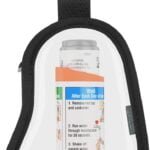
If you are someone who suffers from asthma, you know how debilitating it can be when you don’t have your inhaler on hand. But what if there was another way to manage your symptoms without relying solely on medication? In this article, we will explore some natural remedies and lifestyle changes that can help alleviate asthma symptoms, offering you alternative methods to ease your breathing difficulties and enjoy a better quality of life. So, let’s dive into the world of asthma management beyond the traditional inhaler.
Natural Remedies
Breathing exercises
Breathing exercises are a great way to improve lung function and reduce asthma symptoms. They can help you control your breathing, strengthen your lungs, and decrease the likelihood of asthma attacks. One effective breathing exercise is pursed lip breathing. To do this, take a deep breath in through your nose, then exhale slowly through pursed lips, as if you were blowing out candles. This technique helps to keep your airways open and relieves shortness of breath. Another helpful exercise is diaphragmatic breathing, which involves taking deep breaths using your diaphragm instead of shallow breathing with your chest. This technique can help improve oxygen flow and decrease the feeling of breathlessness. The Buteyko breathing method is also beneficial for asthma management as it focuses on nasal breathing and reducing hyperventilation. Deep breathing exercises, such as belly breathing and alternate nostril breathing, can also provide relief and relaxation.
Herbal remedies
Herbal remedies have been used for centuries to alleviate asthma symptoms and promote respiratory health. Ginger, for example, has anti-inflammatory properties that can help reduce airway constriction and improve lung function. You can consume ginger in various forms, such as grated fresh ginger in tea or adding it to your meals. Another helpful herb is turmeric, which contains a compound called curcumin that has strong anti-inflammatory and antioxidant properties. Turmeric can be consumed as a spice in cooking or taken as a supplement. Honey is also known for its beneficial effects on asthma. Its natural antibacterial and antiviral properties can help soothe inflamed airways and prevent respiratory infections. Lastly, garlic has been found to have anti-inflammatory and immune-boosting properties, making it a great addition to your diet for asthma management.
Vitamin supplements
Vitamins play a crucial role in supporting overall health, including respiratory health. Certain vitamins can help reduce inflammation, boost the immune system, and improve lung function. Vitamin C, for example, is a powerful antioxidant that can help reduce airway inflammation and strengthen the immune system. You can increase your vitamin C intake by consuming citrus fruits, berries, and leafy green vegetables. Vitamin E is another important antioxidant that can help protect the lungs from damage caused by oxidative stress. Good sources of vitamin E include nuts, seeds, and vegetable oils. Vitamin B6 is essential for proper lung function and can help reduce asthma symptoms. Foods rich in vitamin B6 include fish, poultry, whole grains, and bananas. Additionally, magnesium is a mineral that helps relax the muscles surrounding the airways, making it easier to breathe. You can find magnesium in foods like spinach, almonds, and avocados.
Steam therapy
Steam therapy is a natural way to relieve asthma symptoms by moistening and opening up the airways. Steam inhalation is a simple and effective method that involves inhaling steam from a bowl of hot water. You can add a few drops of essential oils, such as eucalyptus or lavender, for added benefits. The warm and moist air helps to loosen mucus and reduce congestion, making it easier to breathe. Warm showers also provide steam therapy and can help relax the muscles, reduce stress, and relieve asthma symptoms. Using a humidifier in your living space can also add moisture to the air and prevent dryness of the airways. Lastly, nebulizers are devices that convert liquid medication into a fine mist that can be inhaled directly into the lungs. This method is often used in more severe cases of asthma or during asthma attacks and requires a prescription from a healthcare professional.
Lifestyle Changes
Avoid exposure to triggers
One of the most important lifestyle changes for managing asthma is avoiding exposure to triggers. Common triggers include pollen, dust mites, pet dander, mold, and tobacco smoke. It’s important to identify your specific triggers and take steps to minimize or eliminate your exposure to them. For example, if you’re allergic to pollen, try to stay indoors on high pollen days or use a pollen filter in your home. If you’re sensitive to dust mites, wash your bedding frequently in hot water and use allergen-proof covers on your pillows and mattress. By reducing your exposure to triggers, you can significantly decrease the frequency and severity of asthma symptoms.
Maintain a clean environment
A clean environment can make a substantial difference in managing asthma. Dust and pet dander can accumulate on surfaces, leading to asthma attacks. Regularly dusting and vacuuming your home can help reduce these allergens. Use a vacuum cleaner with a HEPA filter, as it can effectively trap small particles. Be sure to keep your bedroom clean and free of dust by regularly washing bedding, curtains, and rugs. Additionally, consider using hypoallergenic materials for your bedding and furniture to minimize exposure to potential allergens.
Regular exercise
Regular exercise is not only beneficial for overall health but can also improve lung function and reduce asthma symptoms. Engaging in physical activity strengthens the respiratory muscles and increases lung capacity. It also helps maintain a healthy weight, which can reduce the risk of asthma exacerbations. Choose low-impact exercises such as walking, cycling, and swimming, as they are less likely to trigger asthma symptoms. It’s important to listen to your body and start slowly, gradually increasing the intensity and duration of your workouts. Always warm up before exercising and use your prescribed medications as directed by your healthcare provider.
Adequate hydration
Hydration is important for maintaining proper lung function and reducing the risk of asthma attacks. Drinking enough water helps keep your airways moist and minimizes the production of mucus, making it easier to breathe. Aim to drink at least eight glasses of water per day and increase your intake during hot weather or when participating in physical activities. Avoid excessive consumption of sugary or caffeinated beverages, as they can promote dehydration. If you find it challenging to drink plain water, try infusing it with fruits or herbs to add flavor.

Dietary Modifications
Anti-inflammatory foods
Incorporating anti-inflammatory foods into your diet can help reduce airway inflammation and manage asthma symptoms. These foods are rich in antioxidants and nutrients that promote respiratory health. Some examples of anti-inflammatory foods include fruits and vegetables, such as berries, leafy greens, and cruciferous vegetables. These provide essential vitamins, minerals, and fiber that support a healthy immune system. Additionally, herbs and spices like ginger, turmeric, and garlic have potent anti-inflammatory properties.
Omega-3 fatty acids
Omega-3 fatty acids are beneficial for asthma management due to their anti-inflammatory properties. These healthy fats can help reduce airway inflammation and improve lung function. Good sources of omega-3 fatty acids include fatty fish like salmon, trout, and sardines, as well as chia seeds, flaxseeds, and walnuts. Consider incorporating these foods into your diet regularly to experience their anti-inflammatory benefits.
Vitamin D rich foods
Vitamin D deficiency has been associated with an increased risk of asthma and worsened asthma symptoms. Consuming foods rich in vitamin D can help maintain optimal levels and support respiratory health. Fatty fish like salmon, mackerel, and tuna are excellent sources of vitamin D. Other options include fortified dairy products, egg yolks, and fortified plant-based milk alternatives. If you have limited sun exposure or are unable to obtain sufficient vitamin D through diet alone, your healthcare provider may recommend supplementation.
Avoidance of trigger foods
Some individuals with asthma may have specific trigger foods that worsen their symptoms. Common trigger foods include dairy products, eggs, shellfish, peanuts, and tree nuts. If you notice a connection between certain foods and your asthma symptoms, consider eliminating or reducing your intake of those foods. Keeping a food diary can help you identify any potential triggers and work with a healthcare professional or registered dietitian to develop a personalized diet plan.
Alternative Therapies
Acupuncture
Acupuncture is a traditional Chinese medicine practice that involves the insertion of thin needles into specific points on the body. It is believed to stimulate the body’s natural healing processes and promote overall well-being. Acupuncture has shown promise in reducing asthma symptoms and improving lung function. It may help regulate the immune system and reduce inflammation, thereby alleviating the frequency and severity of asthma attacks. If you’re interested in trying acupuncture, consult with a licensed acupuncturist who has experience in treating asthma.
Yoga
Yoga combines physical postures, breathing exercises, and mindfulness to promote relaxation and balance in the body. Regular practice of yoga has been shown to have positive effects on respiratory health and asthma management. The focused breathing techniques and gentle movements in yoga can help improve lung function, reduce stress, and enhance overall well-being. Certain yoga poses, such as chest-opening poses like Cobra and Fish pose, can help expand the chest and improve breathing. Consider attending a yoga class or following online yoga tutorials specifically designed for individuals with asthma.
Meditation
Meditation is a relaxation technique that involves focusing your attention and eliminating the stream of thoughts that typically occupy the mind. It can help reduce stress, anxiety, and asthma symptoms. Mindfulness meditation, in particular, has been shown to have positive effects on asthma management by promoting a calmer state of mind and reducing airway inflammation. Incorporating meditation into your daily routine can help improve your overall well-being and provide relief from asthma symptoms. There are numerous guided meditation apps and online resources available to assist you in incorporating meditation into your life.
Homeopathy
Homeopathy is a system of alternative medicine that uses highly diluted substances to stimulate the body’s innate healing abilities. While there is limited scientific evidence to support the effectiveness of homeopathy for asthma, some individuals report positive results. Leading homeopathic remedies for asthma include arsenicum album, natrum sulphuricum, and pulsatilla. It’s essential to consult with a licensed homeopath to ensure safe and appropriate use of homeopathic remedies for asthma management.

Managing Stress
Stress reduction techniques
Managing stress is crucial for individuals with asthma, as stress can trigger or worsen asthma symptoms. Incorporating stress reduction techniques into your daily routine can help improve your overall well-being and asthma control. Some effective stress reduction techniques include deep breathing exercises, progressive muscle relaxation, and guided imagery. These techniques help promote relaxation, reduce tension, and lower stress levels. Finding what works best for you and incorporating it into your daily life can significantly benefit your asthma management.
Relaxation exercises
Engaging in relaxation exercises can help calm the mind, reduce tension, and relieve asthma symptoms. Practices such as deep breathing exercises, meditation, and yoga can induce a relaxation response in the body and promote a sense of calmness. Progressive muscle relaxation is another useful technique that involves tensing and releasing different muscle groups to achieve physical and mental relaxation. Experiment with different relaxation exercises and find the ones that resonate with you, making it easier to incorporate into your daily routine.
Counseling or therapy
Managing asthma involves not only physical health but also emotional well-being. Seeking counseling or therapy can be beneficial in managing the emotional stressors and challenges associated with asthma. A mental health professional can provide support, coping strategies, and help develop a positive mindset towards asthma management. Cognitive-behavioral therapy (CBT) is often used to help individuals change their thoughts and behaviors related to asthma, leading to improved self-management and reduced anxiety.
Social support
Building a strong support system is vital for individuals with asthma. Whether it’s family, friends, or support groups, having a network of people who understand and support your asthma management journey can make a significant difference. They can provide emotional support, encouragement, and help you navigate challenges that may arise. Additionally, connecting with others who have asthma can provide a sense of community and allow for the exchange of experiences, tips, and advice.
Breathing Techniques
Pursed lip breathing
Pursed lip breathing is a simple technique that can help relieve shortness of breath and improve lung function. Start by inhaling through your nose for a count of two, then pucker your lips as if you were about to blow out candles and exhale slowly for a count of four. This technique helps to regulate your breathing, prevent the airways from closing prematurely, and promote a more controlled breath.
Diaphragmatic breathing
Diaphragmatic breathing, also known as belly breathing or deep breathing, involves using the diaphragm to take slow, deep breaths. To practice diaphragmatic breathing, place one hand on your chest and the other on your abdomen. Inhale deeply through your nose, allowing your abdomen to rise as you fill your lungs with air. Exhale slowly through your mouth, feeling your abdomen gradually retract. This technique not only promotes efficient oxygen exchange but also relaxes the respiratory muscles and reduces the feeling of breathlessness.
Buteyko breathing method
The Buteyko breathing method focuses on nasal breathing and aims to reduce hyperventilation. It involves consciously decreasing the volume of air you breathe in and out, leading to improved oxygenation and reduced symptoms of asthma. The Buteyko method emphasizes breathing through your nose, breathing softly, and minimizing mouth breathing. Practicing the Buteyko method regularly can help train your body to breathe more efficiently, leading to improved asthma control.
Deep breathing exercises
Deep breathing exercises involve taking slow, deep breaths to increase oxygen intake and promote relaxation. These exercises can be particularly helpful during episodes of stress or anxiety that may trigger asthma symptoms. Simple deep breathing exercises include inhaling deeply through your nose for a count of four, holding your breath for a count of four, and exhaling slowly through your mouth for a count of four. Repeat this cycle several times until you feel more relaxed and your breathing has become more controlled.

Herbal Remedies
Ginger
Ginger is a versatile herb that has long been used for its medicinal properties. Its anti-inflammatory and bronchodilator properties make it effective in reducing airway inflammation and improving breathing in individuals with asthma. Ginger can be consumed fresh, grated into tea, or added to various dishes for flavor and health benefits.
Turmeric
Turmeric contains a powerful compound called curcumin, which has potent anti-inflammatory properties. This makes turmeric beneficial for reducing airway inflammation and alleviating asthma symptoms. Incorporate turmeric into your diet by adding it to curries, soups, or golden milk. Alternatively, turmeric supplements can be taken under the guidance of a healthcare professional.
Honey
Honey has long been used as a natural remedy for respiratory ailments, including asthma. Its soothing properties can help reduce airway inflammation and alleviate coughing. Mix a teaspoon of raw honey with warm water or herbal tea to soothe your throat and enhance respiratory health. Note that honey should not be given to infants under the age of one due to the risk of botulism.
Garlic
Garlic is widely known for its immune-boosting properties and has been used for centuries to alleviate respiratory conditions. It contains sulfur compounds that have anti-inflammatory effects, making it beneficial for asthma management. Incorporate garlic into your cooking or consider taking garlic supplements under the guidance of a healthcare professional.
Vitamin Supplements
Vitamin C
Vitamin C is a powerful antioxidant that can help reduce airway inflammation, strengthen the immune system, and improve lung function. Good food sources of vitamin C include citrus fruits, berries, kiwi, and bell peppers. If your diet is lacking in vitamin C, consider taking a vitamin C supplement under the guidance of a healthcare professional.
Vitamin E
Vitamin E is another antioxidant that helps protect the lungs from damage caused by oxidative stress. It can help reduce symptoms and improve lung function in individuals with asthma. Good food sources of vitamin E include nuts, seeds, vegetable oils, and leafy greens. If necessary, vitamin E supplements can be taken under the guidance of a healthcare professional.
Vitamin B6
Vitamin B6 is essential for proper lung function and can help reduce asthma symptoms. It is involved in the production of certain chemicals that regulate inflammation in the body. Good food sources of vitamin B6 include fish, poultry, whole grains, bananas, and avocados. If you have a vitamin B6 deficiency, your healthcare provider may recommend supplementation.
Magnesium
Magnesium is a mineral that plays a crucial role in relaxing the muscles surrounding the airways. Adequate magnesium levels can help prevent airway constriction and reduce the severity of asthma symptoms. Good food sources of magnesium include dark leafy greens, nuts, seeds, whole grains, and legumes. If necessary, magnesium supplements can be used under the guidance of a healthcare professional.
Steam Therapy
Steam inhalation
Steam inhalation is a simple and effective method for relieving asthma symptoms. Fill a bowl with hot water and add a few drops of essential oils like eucalyptus or lavender. Cover your head with a towel and inhale the steam deeply for a few minutes. The steam helps moisten the airways, loosen mucus, and provide temporary relief from congestion and breathlessness.
Warm showers
Taking warm showers can also provide steam therapy for asthma relief. The warm water helps to hydrate and open up the airways, making it easier to breathe. Spending a few extra minutes in the shower, focusing on taking deep breaths, can provide a soothing effect and temporarily relieve asthma symptoms.
Humidifiers
Using a humidifier in your living space can add moisture to the air and prevent dryness of the airways. Dry air can worsen asthma symptoms by irritating the airways and causing them to constrict. Ensure that your humidifier is kept clean and free of mold to prevent the growth of allergens. A humidity level between 30% and 50% is generally recommended for optimal respiratory health.
Nebulizers
Nebulizers are devices that convert liquid medication into a fine mist that can be inhaled directly into the lungs. They are commonly used in more severe cases of asthma or during acute asthma attacks. Nebulizers deliver medication deep into the airways, providing quick relief and reducing inflammation. However, the use of nebulizers requires a prescription and proper instruction from a healthcare professional.
Conclusion
It is important to note that while the natural remedies, lifestyle changes, dietary modifications, alternative therapies, and stress management techniques mentioned in this article may provide relief for individuals with asthma, they should not replace medical advice or prescribed medications. Asthma is a complex condition that requires individualized management, which may involve a combination of medications and non-pharmacological strategies.
It is recommended to consult with a healthcare professional, such as a physician or asthma specialist, before making any significant changes to your asthma management routine. They can provide personalized guidance based on your specific needs and help monitor your asthma symptoms. Managing asthma often involves a trial and error process to find what works best for you, so be patient and persistent in finding the strategies that provide the most relief.
By incorporating natural remedies, making lifestyle changes, adjusting your diet, exploring alternative therapies, and effectively managing stress, you can enhance your asthma management and improve your overall well-being. Remember that asthma is a manageable condition, and with the right approach and support, you can live a full and active life.









